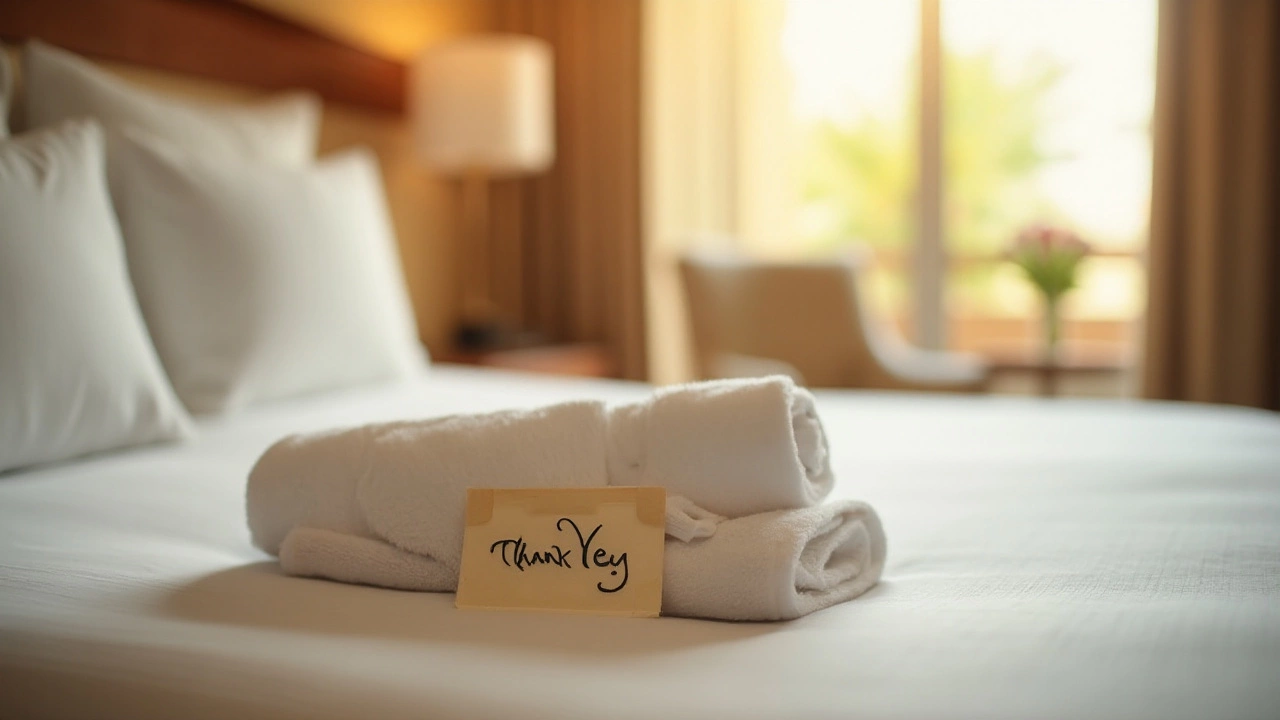Vacations at all-inclusive resorts promise relaxation and indulgence, but they also come with some unwritten rules, especially when it comes to tipping. Many travelers find themselves puzzled over whether or not they should tip housekeeping staff. Knowing these subtle etiquettes can significantly enhance your experience and show appreciation for those who keep your surroundings sparkling clean.
Whether you're unwinding on a tropical beach or exploring a vibrant city, having a clean and tidy room adds to the pleasure of your stay. However, the question remains: how do you approach tipping in these settings where meals, drinks, and entertainment are already included in the price? Let's explore when and how to show your gratitude appropriately, keeping in mind cultural nuances and the impact of your generosity on the lives of the diligent staff.
- Understanding All-Inclusive Resort Services
- Cultural Expectations Around Tipping
- Practical Tipping Tips for Guests
- The Impact of Tipping on Housekeeping Staff
Understanding All-Inclusive Resort Services
Diving into the world of all-inclusive resorts is like stepping into a realm where comfort and convenience meet luxury. These establishments promise their guests a getaway where one does not have to worry about payments for meals, activities, or drinks beyond the initial booking fee. This all-in-one pricing model makes it simpler for travelers to budget their vacations. A significant appeal is the variety and richness they offer – from expansive dining options to engaging entertainment, all included in the rates. This model has exploded in popularity over recent years, with many guests appreciating the peace of mind that comes from not having to carry a wallet around the resort.
While the amenities might make it seem like a world apart, the smooth operation of these resorts involves a vast army of diligent staff members catering to every imaginable need. Among these unsung heroes are the housekeeping personnel who work tirelessly to ensure the immaculate state of guest rooms. Their efforts contribute significantly to the relaxing atmosphere guests enjoy. The best resorts know that luxury is in the details, and keeping a room spotless is a cornerstone of that promise. A clean, well-maintained room is a hallmark of a quality stay, setting the foundation for guests to feel rested and relaxed.
For those new to this vacation style, understanding what all-inclusive means can be eye-opening. While the idea is to cover almost all in-resort expenditures, certain activities or premium services might carry additional costs, such as spa treatments or off-site excursions. These extras, not typically included, can occasionally confuse guests. A little research or a quick chat with the concierge ensures guests are aware of what to expect and can plan accordingly without surprises. Interestingly, according to the Statista Research Department, in 2022, vacationers spent an average of 9% of their travel budget on unexpected resort costs, showcasing the importance of understanding what is truly included.
Within this framework of seemingly endless luxury, the question of tipping often arises. Is it necessary to tip at an all-inclusive, or does the inclusive price cover gratuities too? Policies can vary from resort to resort. Some include tips in their base prices, while others leave it as an optional way to express satisfaction. Knowing the policy of the resort can go a long way in understanding how to approach tipping for housekeeping services. Like so many aspects of travel, understanding the specifics of these services is essential for making the most of your vacation experience.
Email McKinney, director of hospitality outreach at Resort Services, observes, "It's about ensuring guests feel the full hospitality experience while still recognizing the personal touch that small gestures, like tipping, can add to it." This acknowledgment shows that even within inclusive resorts, a touch of personal generosity can enhance an already stellar service experience.

Cultural Expectations Around Tipping
Traveling opens the door to exploring not just new places but also different customs and cultural norms. One such aspect is the practice of tipping, which varies significantly across the globe. When it comes to all-inclusive resorts, the notion of gratuities can be particularly bewildering, especially for guests unfamiliar with the local customs. From bustling cities in Asia to the serene beaches of the Caribbean, understanding these expectations can make your journey smoother and more enjoyable.
In countries like the United States, tipping is a customary practice and is generally expected by service staff, including housekeeping. However, when you find yourself in European countries, the approach might be different. For instance, in France or Finland, tipping is less obligatory as it's often included in the service charge. This means that while leaving a tip is appreciated, it’s not something locals might feel compelled to do. Knowing this subtle distinction can help avoid any awkward moments during your stay.
Travel expert Rick Steves notes, “Tipping situations often confuse travelers. In Europe, services charges are typically included in your bill, while in the United States, gratuities are mainly left to the discretion of the guest.”
In the Caribbean, it’s quite common to tip housekeeping. The islands heavily rely on tourism, and leaving a small token of appreciation for those who clean your room daily is often customary. A good practice while at a resort in Mexico or the Dominican Republic is to set aside a few dollars for each day of your visit. This gesture not only shows your appreciation but can occasionally earn you added perks such as fresh towels daily or extra toiletries.
Moreover, different cultures might have unique tipping practices not just for the housekeeping staff but also other areas of service within all-inclusive resorts. For instance, tipping bartenders or porters can vary by region and resort policies. Always checking the specific tipping guidelines of the resort prior to your stay can be quite beneficial. Reading reviews or asking friends familiar with the area can also provide insight into what is customary.
Travel websites and forums can be a valuable resource. Guests often share their experiences, offering tips that can prepare you for what to expect. A discussion thread might reveal that in a particular resort in the Maldives, while tipping is not wildly expected, the personnel warmly receive it, as it often supplements their income significantly. Considering this, leaving a little something extra can be a kindhearted act and a bridge to cultural understanding.

Practical Tipping Tips for Guests
When navigating the landscape of all-inclusive resorts, understanding how to approach tipping can greatly enrich your travel experience. Although these resorts advertise a 'hassle-free' environment with included meals and beverages, the labor of housekeeping remains a cornerstone that ensures your suite feels like a sanctuary. Recognizing and appreciating their work is not only courteous but often expected. On average, a tip ranging from $1 to $5 per day is a standard gesture. This amount might vary depending on the complexity of requests or the overall standard of service you experience during your stay.
Timing can also play a crucial role in tipping. The optimal approach is to leave a daily tip rather than waiting until the end of your stay. This encourages consistent service as it demonstrates immediate appreciation for the efforts of the housekeeping staff. Daily gratuities can be left on the pillow or a bedside table with a note of thanks. Make sure it is in a visible spot to minimize any confusion. Exceptional service, like crafting a surprise towel animal or fulfilling special requests promptly, could warrant a bonus tip as a personal touch of gratitude.
How Cultural Norms Affect Tipping
Understanding cultural practices in the destination you are visiting can elevate your tipping etiquette. Not all countries view tipping the same way, so it is beneficial to do a little research before you pack your bags. For example, while in North America, tipping is seen as customary and even expected, in countries like Japan, it can be considered an insult. Guests should be mindful of these nuances not only to align with local expectations but also to enrich their travel interactions. By showing respect for local customs, tourists can often find themselves receiving more personalized and attentive service, as they are seen as considerate guests.
A study by the International Journal of Hospitality Management indicated that guests leaving tips are generally more satisfied with their stay, suggesting a reciprocal relationship between tipping and service quality. A little gratitude goes a long way, and often staff will remember patrons who display genuine appreciation. Engaging with staff by expressing thanks or commenting on their attention to detail can make your stay feel all the more welcoming.
Budgeting for Tipping during All-Inclusive Stays
For travelers conscious about their budget, planning ahead can alleviate any stress associated with tipping. It is advisable to set aside a specific amount in smaller currency denominations exclusively dedicated to tipping. This allows for seamless transactions and helps maintain a generous spirit without impacting your spending on other activities. Many experienced travelers recommend carrying a mix of $1 and $5 bills when traveling to all-inclusive destinations. This way, you are never caught off guard and can always display generosity when it's due. For families and groups, budgeting collectively for tips can manage expenses more efficiently while ensuring everyone in the party participates in the custom.
"Travel isn't just about the destination, it's about the gestures and connections you make along the way," notes travel expert Rick Steves.
Embracing this perspective can transform a routine holiday into an immersive cultural experience. Tipping, though a seemingly small gesture, embodies this spirit of travel, breaking barriers and forging bonds between guests and local communities.

The Impact of Tipping on Housekeeping Staff
Tipping the housekeeping team in all-inclusive resorts can have a meaningful impact, not only enhancing the personal experience of your stay but also contributing significantly to the livelihoods of those who work tirelessly behind the scenes. Housekeeping staff provide a critical service that often goes unnoticed while guests enjoy their vacation, ensuring rooms are clean, comfortable, and welcoming. Despite the intensity of their work, which can often involve long hours and substantial physical effort, these workers are typically among the lowest-paid staff in the hospitality industry. Providing a tip can directly influence their earnings and improve their quality of life, acknowledging their hard work and dedication.
The structure of the hospitality business model often results in basic wages for housekeeping employees, who rely heavily on tips to augment their income. A study by Cornell University highlights that tipping can account for nearly 25% of a service employee's income. This data underscores the importance of guest gratuities not just as a token of appreciation, but as a vital component of their income. It’s common for resorts to maintain a practice of including service charges in the total cost of the package; however, these charges seldom make their way to the housekeeping staff directly. By leaving a tip, guests can ensure that the housekeeping staff receive direct financial gratitude for their attentive service.
While the practice of tipping may vary culturally and globally, it fosters an environment of goodwill and mutual respect. In North America, tipping is part of the service culture, unlike some regions in Europe or Asia where it's less customary. Understanding these cultural differences can help guide decisions on whether and how much to tip. A modest sum left daily on the bedside table or the pillow, accompanied by a note of thanks, can mean a great deal to the housekeeping team. Such gestures not only boost morale but can lead to even better service, creating a win-win situation for both guests and staff. In many anecdotes shared by travelers, exceptional service received during a stay is noted when gratuities are modestly included.
Let’s break down some typical tipping practices to offer clarity. A commonly recommended guideline in many resorts is to tip one to five dollars per night, depending on the level of service and the type of resort. For luxury or high-end resorts where the service is particularly outstanding, the higher end of the scale can be more appropriate. To avoid misunderstandings, it’s wise to verify at the front desk whether a service fee is factored into your stay, though direct tips to housekeeping are usually appreciated separately. When traveling with a family, adjusting the tip to account for additional cleaning work such as extra towels or rolled-out cots can further enhance your relationship with the staff.
"The simple act of tipping shows appreciation and recognition, creating a positive impact for both the recipient and the giver," notes the American Hospitality and Lodging Association.
Ultimately, the power of tipping extends far beyond the monetary contribution. It becomes a form of validating and appreciating the unseen efforts that enhance your stay. A gracious act as leaving a tip can encourage hospitality professionals who, by making guests' experiences memorable, display a level of dedication and attention to detail that goes beyond their job descriptions.
